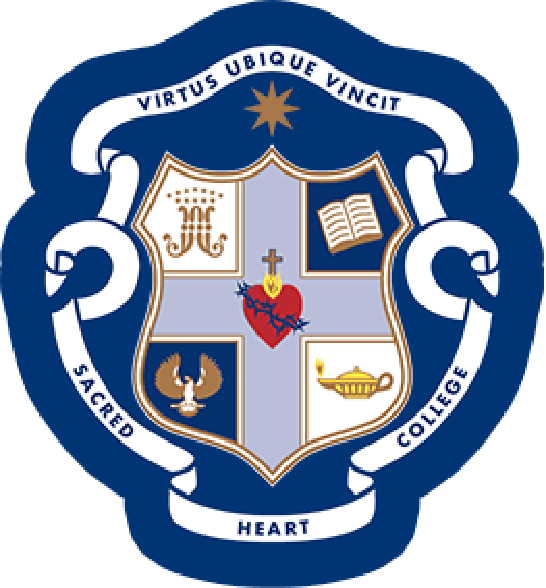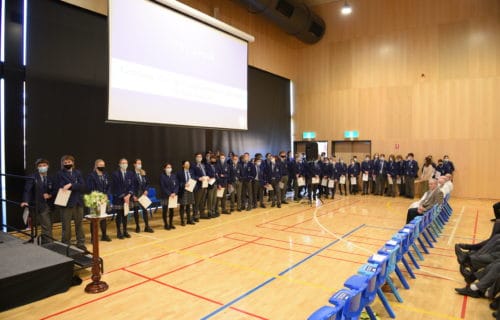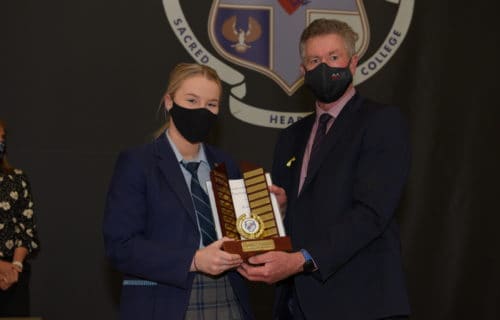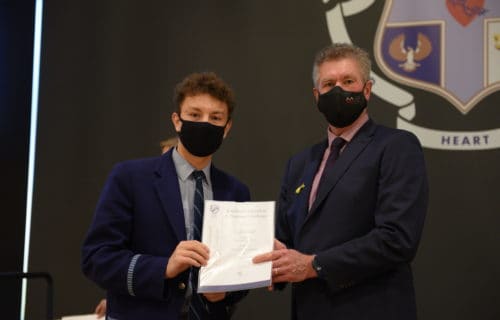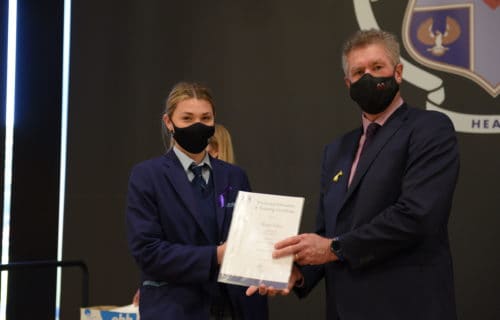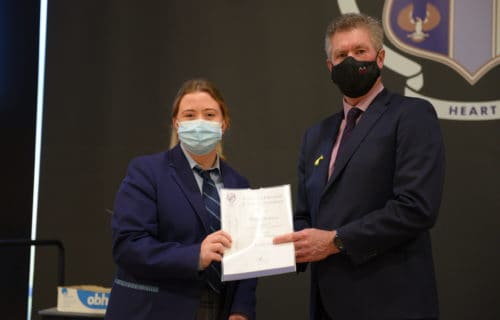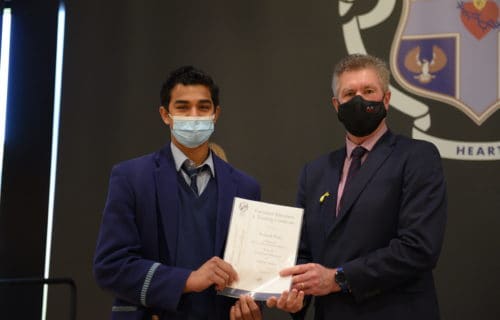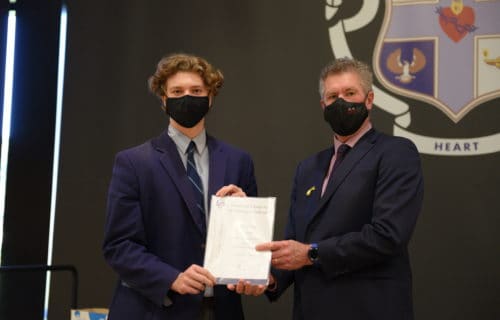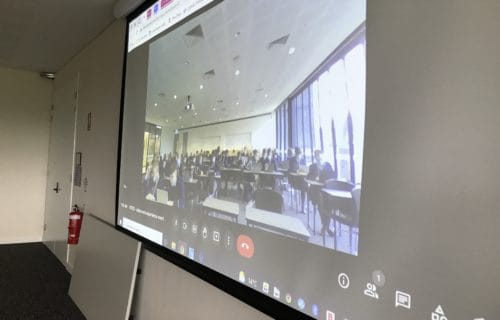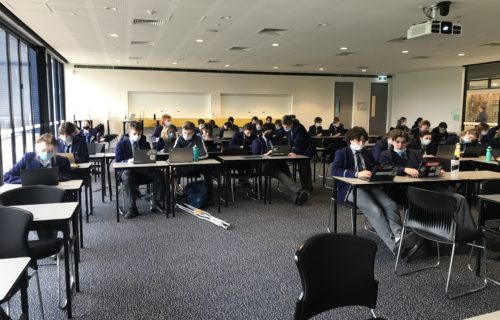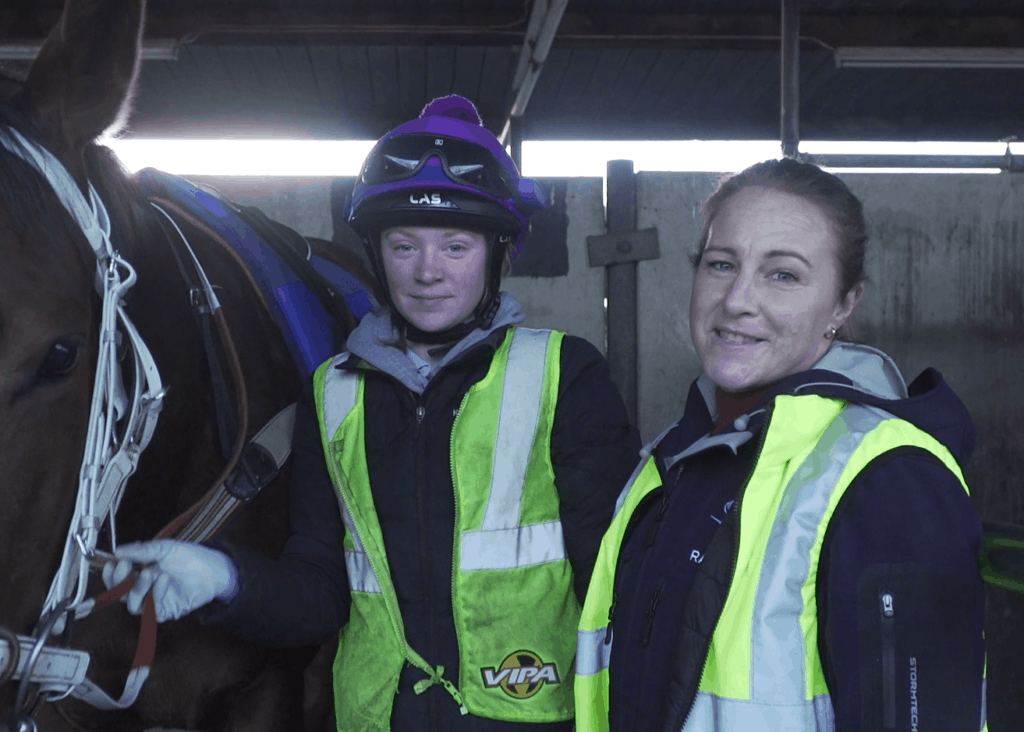
To our Sacred Heart Community
Students at Work
Ride like a Girl
Year 11 student Madi Sanders grew up in Port Lincoln and started riding horses when she was three years old, she rode for a couple of years and then had an extended break from riding. When still in Port Lincoln she did a school based science project on horses heart rates which rekindled her desire to ride again.
In 2019 when the family moved to Adelaide Madi pursued this interest in riding which has now evolved into a career focus on becoming a jockey. This year Madi has combined a Certificate 111 in Racing (stable hand) as a school based traineeship with her Year 11 studies. The competencies that she completes through her industry based training contribute toward her SACE and her work placement adds to her experience, skills and passion for the industry.
When Madi first spoke to me about this pathway her courage and commitment was very evident. 4.30 am starts in themselves are pretty daunting let alone the hard work that stable hands are often expected to do. Madi is featured in a Racing Industry Careers Video that Racing SA has put together and is hosted by female jockey Clare Lindop.
Madi’s dream is to become a jockey and as seen in the video she is already involved in track work at Morphettville racecourse. Madi is bravely following her career dream and has worked hard this year to ensure that she is also able to attain her SACE in addition to the industry specific training she is getting. A combination of hard work, commitment and passion will stand Madi in very good stead as she progresses her career beyond school.
Clare Lindop is also facilitating some industry exploration activities for interested students and she has invited our school to a “Behind the Scenes” tour at Morphettville Racecourse in term 4 where careers in animal care, agriculture, turf management and veterinary science in addition to careers directly allied to racing can also be seen. Any interested students should register in the careers office.
Work Experience for 2021
BEFORE CONSIDERING WORK EXPERIENCE PLEASE BE AWARE OF THE FOLLOWING:
It is a legal requirement that prior to commencing Work Experience students are inducted in the following areas: Work Health and Safety Act 2012 SA, Children and Young People (Safety) Act 2017 SA, Sex Discrimination Act 1984 SA, Equal Opportunity Act 1984 SA and Child Safety (Prohibited Persons) Act 2016 SA. Adequate time (approximately 5 hours) should be allocated to cover these topics effectively and students need to demonstrate their understanding. This induction is done by the school and is consistent with our Duty of Care to ensure that no student is placed where they may not be safe physically or psychologically.
In addition to this, the Work Experience form must be signed by the student, work placement provider, parent/guardian (all arranged by the student) and finally the principal or delegate (arranged by the school). The original Work Experience Agreement form then becomes a legal contract which sets the school insurance cover in place and must be retained by the school.
The school must also provide a contact person who is responsible for each student for the duration of their placement.
Work Experience is a very valuable opportunity for most students however, it does take time to ensure that the above expectations are met. We are happy to accommodate students in the times allocated. Please do not cause yourself or the College embarrassment by making other arrangements and then asking for exceptions to be made.
Students who wish to do Work Experience during 2021 are advised that the dates are:
| Work Experience Weeks | Paperwork Deadline |
| 15 – 19 November (Optional Work Experience for Year 12’s Only) | 15 October |
| 29 November – 3 December | 5 November |
Work or job trials are not sanctioned by SA Work Experience guidelines.
Please note this is general Work Experience only. Students undertaking a VET program will need to organise their VET work placement with the VET Office.
Key Dates
-
Westpac Young Technologists Scholarship
Value: $5,000 AUD per year
Open/Closing Dates: June 1st, 2021 – November 1st, 2021
Westpac Young Technologists Scholarships are designed specifically for high school graduates who are passionate about technology and eager to explore its potential for good. They are looking for curious young minds, open to new ideas and untapped opportunities.
-
SAPOL Police Officer Recruitment Seminar
Thursday 23rd September 6:30 pm – 8:00 pm
SAPOL Headquarters, Adelaide
The seminar covers information for police officers and each session usually covers:
- the requirements and correct submission of application forms
- the SAPOL Recruitment Test (TAFE SA)
- evaluation and testing processes
- the panel interview
- physical testing, including required standards and information on how to prepare yourself.
You can also hear from serving police officers about their experiences at the academy and on the job.
Find out more here
-
ADF –ADFA Virtual Information Session
Thursday 23rd September 6:30 pm – 7:30 pm
Online
Would you like the opportunity to undertake military training while earning a degree? All without debt – in fact, ADF will pay you!
Head to the upcoming info session to speak with current serving military personnel and learn more about the Australian Defence Force Academy.
Find out more here
-
UNSW Year 9 to 12 Short Course – Current Affairs in Aviation
Monday 27th September 9:30 am – Tuesday 28th September 3:00 pm
Online
UNSW Aviation is presenting a two-day course for secondary students during the school holiday break on 27th and 28th September 2021. The course is aimed at those interested in a future career in aviation. The Aviation industry is a global, social and economically important industry that brings people together. From the technically challenging cockpit with awe-inspiring views, to the operational, logistical, safety and financial challenges of managing airports and airlines, UNSW Aviation is uniquely placed to create graduates ready to take on opportunities in this exciting and growing industry.
UNSW School of Aviation is proud to be supporting the Royal Flying Doctor Service (SE Section) with the donation of 100% of the registration fees for this course. All proceeds from the course are being donated to the RFDS.
Find out more here
-
AIE Industry Experience Day
Thursday 30th September 10:00 am – 3:00 pm
Academy of Interactive Entertainment and Online
AIE’s Industry Experience Days are a great opportunity for students in Years 10, 11 and 12 to learn about the local and international game development, 3D animation and visual effects industries. Students will get the opportunity to learn about the different pathways to get into the industry, what should be in a portfolio and will be able to get creative in practical workshops using industry-standard 3D animation and game development tools.
The sessions are run by industry professionals who have worked on some blockbuster games and films. Everything is provided for you to participate in the hands-on workshops and you will be using the same software that is used in the industry.
If you are thinking about a career in the games or film industry then we highly recommend registering for this free event.
Find out more here
-
Virtual Camp Parliament for Girls Australia
Saturday 30th October 8:00 am – 12:00 noon
Online
Virtual Camp Parliament for Girls Australia is an interactive online class that introduces girls ages 12 to 17 to Australia’s parliamentary system of government.
Virtual Camp Parliament for Girls begins with a lesson on the structure and history of the Australian government. The lesson goes on to review the eligibility requirements to stand for office and a review of political parties with students for their own parties. Students will learn about the structure of elections and the women that made history serving in government. Each student will stand for office, create a campaign platform, vote in a virtual election, and form a government to pass a bill. Each student will serve as a MP. Cost is $125.00.
Find out more here
-
C.A.S. Hawker Scholarships
The 2022 C.A.S. Hawker Scholarships open on Monday 6th December and close on Friday 7th January 2022.
C.A.S. Hawker Scholarships are one of the most generous privately funded scholarships available to undergraduate students in Australia. Each residential scholarship is valued at up to $60,000 over three years. The scholarships are available to all Australian students. The majority have been awarded to students entering their first year of university studies.
Selection is largely based on personal qualities and demonstrated leadership as well as academic ability. Undergraduate Hawker Scholars are able to attend a range of Australian educational institutions.
The Charles Hawker Scholarship perpetuates the memory of scholar, soldier and pastoralist Charles Allan Seymour Hawker and commemorates the achievements of one of Australia’s most respected statesmen.
For information about the scholarship and download an application form visit www.hawkerscholarship.org
Vocational Education and Training
Update September 2021
Term 3 has been a very busy term in the VET department – VET and General Assembly, Virtual Work Experience sessions and conducting over 150 interviews for students that intend to study a VET course in 2022.
Year 11 & 12 VET students acknowledged at the VET & General Assembly
On Wednesday Week 7, Marcellin Campus acknowledged students who are on track to obtaining a Level III Certificate through their VET studies at the end of the school year. This included Year 12 and Year 11 VET students. In addition, we acknowledged Year 12 students who are studying a VET Certificate at any level.
Kate Perry was awarded “Year 12 VET student of the year”. Kate has been undertaking a Certificate III in Early Childhood Education and Care at Queensford College.
Virtual Work Experience
In September, Marcellin Campus held Virtual Work Experience sessions for students planning on studying a (subsidised) VET Course in 2022.
75 students in Year 10 & 11 undertook the Virtual work experience in the McAteer Centre Function Centre with ‘The Careers Department’ via web link.
Virtual Industries included;
- Animal Studies
- Automotive
- Construction
- Early Childhood Education
- Electrical
- Health Support
- Horticulture
- I.T.
- Salon Assistant
Students receive a certificate of completion and this will be used as relevant industry evidence for the new VETRO referral process.
Sarah Benedictson
VET Coordinator
Tertiary Updates
-
UTAS Relocation Support Allowance (Interstate and NZ residents)
Value: Up to $5,000 AUD
Open/Closing Dates: August 16th, 2021 – February 28th, 2022
The University of Tasmania is offering a limited number of relocation support packages to assist interstate students with the costs of relocating to Tasmania to attend University. There are two support packages from which eligible students are able to select.
-
University of Adelaide Parents Information Session
Tuesday 21st September 6:30 pm – 8:00 pm
Online
Adelaide Uni are pleased to present another online opportunity for parents, caregivers and families of high school students to meet experts from the Domestic Recruitment Team and hear information about future tertiary applications.
At this 2021 Parent Information Session you will be able to hear about degree choices, SATAC procedures, timelines, support services, accommodation, and everything else that is involved in the lead up to life at university. There will also be a chance for you to ask questions or discuss anything else that they might be able to help with.
Find out more here
-
TAFE SA Information Sessions – Arts and Design
Thursday 14th October 6:00 pm – 7:00 pm
TAFE SA, Adelaide Campus
Attending an information session allows you to meet with the teaching staff, learn more about a course and where it can lead you, discuss study options, find out about the application process and ask course-related questions. Information sessions are held on location, so it’s also a great chance to check out TAFE SA’s outstanding training facilities.
Upcoming sessions include:
- Advanced Diploma Program in Applied Fashion Design and Merchandising (Generalist)
- Certificate III in Applied Fashion Design and Technology
- Advanced Diploma of Applied Fashion Design and Merchandising (Fashion Business)
- Bachelor of Creative Arts (Fashion) – Flinders University
- Bachelor of Creative Arts (Costume Design) – Flinders University
Find out more here
Spotlight on Careers
-
How to become a Speech Pathologist
Improve people’s quality of life through communication
What do Speech Pathologists do?
Speech Pathologists are experts who assist people with communication disorders, which could be problems with speaking, listening, reading, or writing due to a variety of issues. They work with people of all ages, from children to the elderly. Your work as a Speech Pathologist can greatly help improve a person’s quality of life.
If you have a passion for helping people and are seeking a rewarding and challenging career, Speech Pathology could be ideal for you.
About you:
- Caring and empathetic
- Excellent communicator
- Passionate about helping people
- Emotionally resilient
- Likes to work indoors
- Good time management skills
- Works well in a team and independently
- Determined and adaptable
The job:
- Helping patients learn to communicate, verbally and non-verbally
- Identifying the cause and extent of communication disorders
- Giving patients strategies to manage their daily lives
- Relaying relevant information to other medical and health professionals
- Providing advice and support to family members, friends and carers of patients
- Working with people of all ages, from children to adults
- Helping patients overcome stutters and swallowing issues
Lifestyle Impact: Low
- Part Time opportunities: Moderate – around 44% of Speech Pathologists work part-time (source: joboutlook.gov.au).
- Average hours for full-time workers: 41 hours a week, which is average (source: joboutlook.gov.au).
- Speech Pathologists’ salary (average) $80,000* per year (source: com.au). *Salaries vary depending on your skills and experience.
- Future career growth: Very strong (source: joboutlook.gov.au).
- Most of your work will be done indoors, either in clinics and hospitals, or travelling to patients in their homes.
Speech Pathologists are most in demand in these locations:
This is a small occupation, with around 7,300 people working as Speech Pathologists in 2019 (source: joboutlook.gov.au). However, there is very strong demand in the future and a strong need for more roles to be filled. Speech Pathologists are needed all across Australia, and you might have more luck finding work in regional and rural areas where there is a shortage of healthcare professionals. Most Speech Pathologists work in the healthcare and social assistance and education industries.
There are jobs available around Australia and globally. Most of your work will require you to be face-to-face with your patients, so there is little opportunity to work remotely or from home.
How to become a Speech Pathologist in Australia
To work as a Speech Pathologist, you will need to complete a Bachelor- or Master’s-level qualification that has been accredited by Speech Pathology Australia.
Step 1 – Complete Year 12 with a competitive ATAR, check Uni prerequisites.
Step 2 – Volunteer or get work experience in a health-related setting, such as in a hospital or aged care facility.
Step 3 – Complete an accredited university degree. This will usually be a Bachelor of Speech Pathology. You can find a full list of currently accredited qualifications on Speech Pathology Australia’s website here.
Step 4 – Register with Speech Pathology Australia to become a Certified Practising Speech Pathologist (CPSP) and start working.
Step 5 – Keep your skills and knowledge up to date through mandatory Continuing Professional Development (CPD) each year.
Find out more here
-
How to become a Shearer
What do Shearers do?
Shearers use specialised tools to remove wool from livestock, such as sheep, goats, alpacas, and other animals. They need to know how to handle animals properly to minimise discomfort and shear wool in one clean piece.
If you are fit and healthy, love to work with animals, and are prepared to live and work in a regional or rural area, becoming a Shearer could be perfect for you.
About you:
- Fit and healthy
- Good with your hands
- Thorough and methodical
- Can work with animals
- Willing to live in a regional or rural area
- Good communicator
- Resilient and tough
- Can work in teams and independently
The job:
- Taking animals from holding pens to prepare them for shearing
- Selecting appropriate tools to use
- Shearing and removing wool from animals
- Keeping animals calm and comfortable during shearing
- Inspecting animals for cuts and treating them
- Returning animals to let-out pens for counting and checking
- Maintaining and cleaning tools and workspaces
- Using special tools to shear stud animals
Lifestyle Impact: High
- Part Time opportunities: Moderate – around 36% of Shearers work part-time (source: joboutlook.gov.au).
- Average hours for full-time workers: 43 hours a week, which is average (source: joboutlook.gov.au).
- Shearers’ salary can vary greatly depending on experience and number of animals processed. For an idea of pay, take a look at the Pastoral Award Pay Guide.
- Future career growth: Stable (source: joboutlook.gov.au).
- You’ll need to be prepared to do lots of physical work and be on your feet for most of the day.
Shearers are most in demand in these locations:
This is a small occupation, with around 3,400 people working as Shearers in 2020 (source: joboutlook.gov.au), with stable growth expected over the next five years. There is most demand for Shearers in New South Wales, South Australia, Western Australia, and Tasmania. Most Shearers work in the Agriculture, Forestry and Fishing industry. Many farms are located in regional and rural areas of Australia, which means you will need to be willing to live away from the city to secure work.
Shearers are needed in many countries around the world, particularly those that produce a lot of wool, such as New Zealand. Farm work can be lucrative for those looking to go on a working holiday.
How to become a Shearer in Australia
You don’t need any formal qualifications to work as a Shearer in Australia, but there are courses you can take to build your skills. Having lots of hands-on experience will definitely work in your favour.
Step 1 – Complete at least Year 10 with a focus on English.
Step 2 – Try and find work experience in an agriculture-related setting or on a farm where you can get exposure to animals and the environment.
Step 3 – Consider taking a qualification to build your skills, such as a Certificate II in Shearing or Introduction to Shearing Skill Set.
Step 4 – Find work as a Shearer and build on your experience.
Step 5 – Continue gaining experience and skills for life.
Find out more here
-
What is a Scientist?
For a long time, there has been a common stereotype of scientists – you know the ones with a white male, in a white lab coat (probably a genius) mixing liquids in beakers?
The problem with stereotypes is that they tend to oversimplify and exclude: they function to reinforce misconceptions, and without being challenged, can further alienate already underrepresented populations.
UNSW’s What is a Scientist? Is challenging those common misconceptions by resetting the lens on what a scientist’s career, journey, and background looks like.
On their website, you can hear from 8 different scientists, who speak about their diverse experiences, interests and journeys – and the passion for science that unites them.
See more here
Interesting Stuff
Persistence pays off ….
I was recently reading about young entrepreneurs and found that the following analogy used in response to a question about being a successful entrepreneur can really apply to any challenge that we might be undertaking;
What would you say are the top three skills needed to be a successful entrepreneur?
A: Persistence, persistence, persistence. Someone once told me, you can have a C+ idea. But if you have A+ persistence, you’re probably still going to be successful. An entrepreneur and success are separated by a metaphorical brick wall. You chip away at it, you chip away at it and in the beginning nothing happens. Then, on the thousandth time you chip at it, a single brick falls away. And then, almost all at once, the brick wall suddenly collapses. Business is a lot like that. As an entrepreneur, if you don’t have persistence to get through that brick wall, you won’t succeed.
To read more about the young man responsible for the quote and also founder of a California based startup Halfcode that uses Artificial Intelligence to develop smart technology to help people with disabilities please see this link.
Letz Live
Unsure what you want to do in 2022? A Gap Year could be for you.
- Meet likeminded people
- Job and accommodation sorted before you leave
- Travel on your time off
- Letz Live Australian and UK based team are available 24/7
Letz Live have reopened their applications for placements commencing in 2022.
Contact www.letzlive.org for more information.
Daniel Cagney – CCUSA Camp Counselors USA – Award
In memory of Daniel Cagney;
Past student at Sacred Heart College
Participant on the Camp Counselors USA program
Camp Counselor at Camp Pinewood in North Carolina
In recognition of Daniel’s outstanding commitment to youth through his work as an American Camp Counselor, CCUSA is honoured to offer the:
Daniel Cagney – CCUSA Camp Counselors USA – Award
Every year from June, graduating Year 12 students from Sacred Heart College will be eligible to receive this Award by applying and being accepted to the CCUSA Camp Counselors USA program for the following year.
All students who apply and are successfully accepted to the program by January 31st will go into the draw to receive the Award.
The recipient will be drawn at the “Formal Friday – Suit Up” event which is run in conjunction with Beyond Blue by Daniel’s Family, in February each year.
The recipient will receive a $250 reimbursement from the CCUSA Camp Counselors USA program and the honour of continuing Daniel’s legacy of his commitment to children at summer camps in the USA.
Wombat Books Illustration Challenge 2021
Wombat Books are seeking original illustrations from Australian school-aged students (aged 5 – 18) to publish in a unique picture book by the team at Wombat Books.
The Challenge has been established in order to provide aspiring young illustrators with the opportunity to be published in a professionally produced children’s book and gain an introduction into the world of illustrating.
Winners of the Illustration Challenge will have their illustrations published in the upcoming picture book Screen Free Holiday, due for release in 2022. They will also receive two free copies and will be acknowledged on the Wombat|Rhiza site, including their social media. Judging decisions will be made by Wombat Books.
Entries are open until 30th November.
Find out more and enter here.
GAPYear in Agriculture
GAPYear is a new initiative from Growcom, the peak body for horticulture in Queensland. They want to give young Aussies the chance to explore regional Queensland, meet like-minded people, and partner with ethical employers for a year like no other. Travel as far north as Cairns for mangoes and reef tours, or as far south as Stanthorpe for apples and national park treks.
The aim is to take the guess work out of gap year options by providing a no nonsense, backstage pass to all that Queensland has to offer.
If you’re a school leaver, you can get a free FarmReady card to connect you with approved employers and amazing experiences.
Find out more and get GAPYear ready here.
Social Media and your Job – Does it Matter?
Let’s face it, pretty much all of us use some form of social media these days. It can be a great way of keeping in touch with friends and family, finding news and events, or even just entertaining ourselves. But as social media becomes even more a part of our lives and identity, there’s something else we need to consider – does it affect our jobs or future jobs? Whatever you post on the internet could potentially be seen by anyone, including employers, fellow workers, and customers. And more and more professions are introducing social media policies that staff need to follow, or there could be some serious consequences. We’re here to explain the dos and don’ts of social media as a student and professional, so you can maintain a good reputation online.
What counts as “social media”?
What can be defined as “social media” is actually quite broad, and includes more sites than you’d think than just Facebook and Instagram. In fact, almost any online platform where content can be shared could potentially be considered social media. Some common examples include:
- Social networking platforms (Facebook, Twitter, WEChat, WhatsApp, etc)
- Professional networking platforms (LinkedIn, etc)
- Discussion forums (Reddit, Whirlpool, etc)
- Media sharing platforms (YouTube, TikTok, Flickr, Instagram, etc)
- Content production and blogs (Tumblr, WordPress, etc)
- Wikis (Wikipedia, etc)
- Gaming platforms and environments (Online games, Discord, Steam, etc)
While many of these sites and platforms allow you to post under a username or anonymously, it’s likely that it can still be tracked back to you in some way.
Take this as a general rule of thumb: if you’re putting something on the internet where other people can potentially see it, think twice before you hit post.
Your conduct on social media
While rules and policies can vary between job areas and individual organisations, there are some basic rules that are fairly common between them all. Even if the place you work or study has no specific social media policy, these are some good guidelines to follow to make sure your online presence doesn’t cause any conflict with your job or studies.
Appropriate behaviour
This one’s fairly obvious: make sure you behave appropriately online. There are real people behind the screens, so treat people online like you would treat them in person. And maybe think twice before letting your mate post those embarrassing photos! Other things that could get you in hot water include:
- Cyberbullying and harassing others online
- Posting obscene or offensive things
- Spreading information that is false, misleading or deceptive
Posting about your job
Be extremely careful if you make any sort of post or reference about your job (even if it’s to say something nice). If you’re posting a photo or video wearing a company uniform or on work premises, make sure this is okay according to your workplace’s policy. And if you’re unhappy with something that’s happened with work, don’t vent about it online; we know it can be tempting to badmouth your annoying colleague or a frustrating customer experience, but this can get you in a lot of trouble.
Your workplace should have an appropriate channel you can take these concerns, like talking to your manager. There are even some cases where posting about your job on personal social media sites is not allowed at all – you’ll see more about this below.
It applies to students too
Remember, these rules aren’t just for workers to follow. Universities and other education providers usually also have social media policies that are strict about what you post that might be associated with them as well. Your behaviour online could potentially lead to some serious consequences, like having your enrolment cancelled.
If you’d like to take a look at an example, here’s Bond University’s Social Media Policy – it applies to both staff and students at Bond.
It’s not all bad
On the flip side, social media can be used as an incredibly powerful tool to put yourself out there to potential employers. These days it’s becoming more and more common for people to find work through social media channels, so making a good impression is always important. Studies show that three out of four managers will take a peek at a potential candidate’s social media profile before making a decision.
So if you are going to use social media, make sure you use it the right way.
Disclaimer: Statements on careers and courses included in this newsletter are not necessarily those of Sacred Heart College. i.e. The text of notices on courses and industry prospects may be taken directly from their correspondence/publicity material. Some material taken from Study Work Grow (South Australia Careers News).


